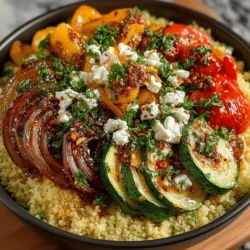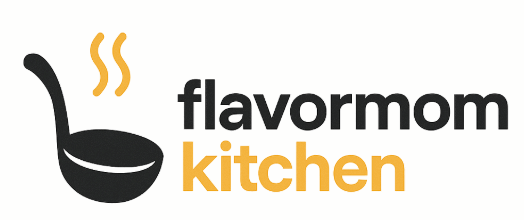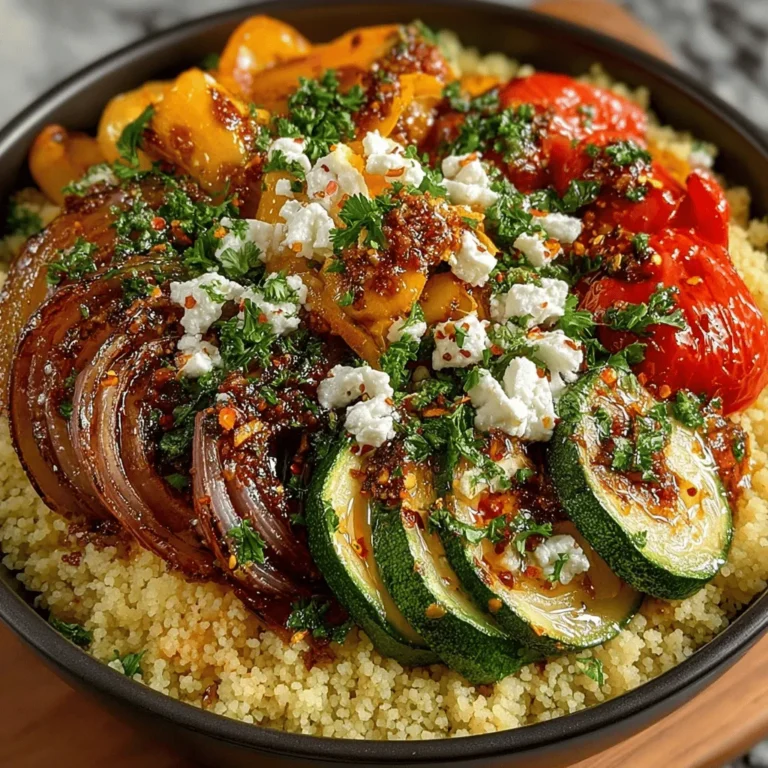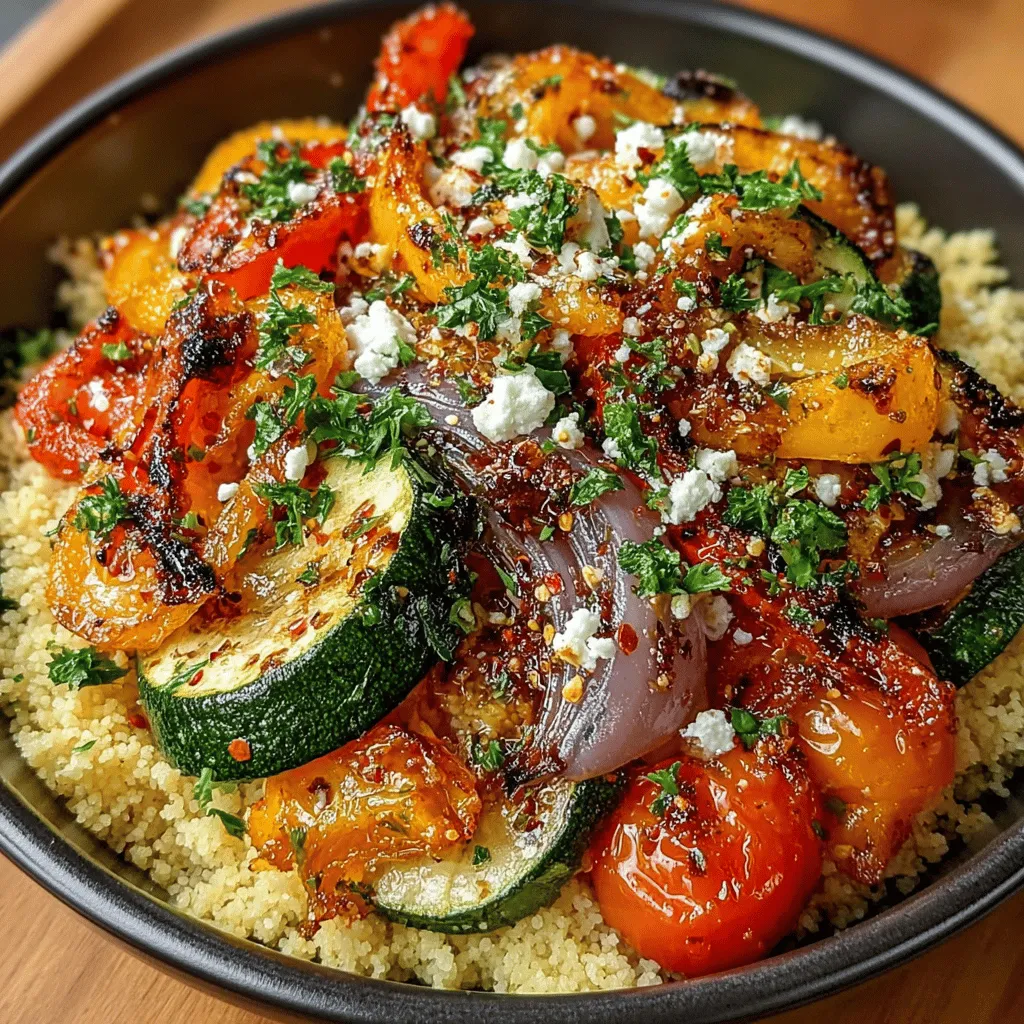Colorful Roasted Veggie Couscous Bowl with Feta: A Vibrant, Healthy Meal
In today’s fast-paced world, the quest for nutritious, wholesome meals has never been more essential. Enter the Colorful Roasted Veggie Couscous Bowl with Feta—a dish that not only captures the eye with its vibrant hues but also nourishes the body with seasonal vegetables and wholesome grains. As plant-based diets gain traction, this meal serves as a perfect example of how to incorporate fresh produce into a balanced lifestyle while enjoying a variety of flavors and textures. This recipe is not just a feast for the eyes; it’s a celebration of nature’s bounty and a step toward healthier eating habits.
Couscous, often hailed as a versatile grain, serves as the foundation for this delightful bowl. Its light, fluffy texture complements the roasted vegetables beautifully, providing a satisfying base that holds up well against the bright flavors of the dish. The addition of crumbled feta cheese adds a creamy, tangy element, elevating the overall experience to one that is both comforting and refreshing.
Understanding the Ingredients
To truly appreciate the Colorful Roasted Veggie Couscous Bowl with Feta, it’s essential to delve into each ingredient’s role, focusing on its nutritional value and how it contributes to the dish’s delightful flavor profile.
The Health Benefits of Couscous
Couscous is a staple in many Mediterranean diets and is made from semolina wheat, which is high in protein and fiber while being low in fat. This grain is an excellent source of complex carbohydrates, providing sustained energy without the crash associated with refined carbs. Couscous is also rich in essential nutrients such as selenium, which plays a crucial role in metabolism and thyroid function. It’s quick to prepare and incredibly adaptable, making it a favorite for busy home cooks.
The Nutritional Powerhouses: Vegetables
The heart of this bowl lies in its colorful array of roasted vegetables, each contributing not just flavor but also a wealth of nutrients.
– Red Bell Peppers: These vibrant veggies are loaded with vitamins A and C, making them fantastic for boosting the immune system and maintaining healthy skin. Their natural sweetness intensifies during roasting, creating a caramelized flavor that perfectly complements the other ingredients.
– Zucchini: A low-calorie vegetable that is high in water content, zucchini adds a tender texture to the bowl. It is a great source of vitamins B6 and C, as well as potassium, which is vital for maintaining healthy blood pressure levels. When roasted, zucchini becomes slightly sweet and has a delightful, soft texture that pairs well with firmer vegetables.
– Cherry Tomatoes: Bursting with juiciness, cherry tomatoes offer a concentrated source of antioxidants, particularly lycopene, which has been linked to numerous health benefits, including heart health. Their vibrant color and sweet flavor enhance the overall taste of the dish, making them a must-have ingredient.
– Red Onion: Known for its sharp flavor when raw, red onion mellows and sweetens beautifully when roasted. This vegetable adds depth to the dish and is an excellent source of antioxidants and vitamins C and B6.
The Richness of Feta Cheese
Feta cheese, with its crumbly texture and tangy flavor, is a perfect finishing touch for this couscous bowl. Made from sheep’s or goat’s milk, feta is lower in fat than many other cheeses while still providing a good source of protein and calcium. Its salty, creamy profile enhances the dish, balancing the sweetness of the roasted vegetables and the mildness of the couscous.
The Flavor Enhancers: Olive Oil, Oregano, Garlic Powder, and Lemon Juice
To tie all the ingredients together, a few key flavor enhancers are essential:
– Olive Oil: Not only does olive oil add richness and a smooth mouthfeel, but it is also packed with healthy monounsaturated fats and antioxidants, making it a heart-healthy choice for cooking and dressing.
– Oregano: This aromatic herb is a staple in Mediterranean cuisine and adds a warm, earthy flavor to the dish. Oregano is also rich in antioxidants and has anti-inflammatory properties.
– Garlic Powder: While fresh garlic is often preferred, garlic powder is a convenient way to infuse the dish with garlicky goodness without the added prep time. It brings depth and enhances the overall flavor profile.
– Lemon Juice: A splash of lemon juice brightens the dish, adding acidity that balances the richness of the feta and olive oil. The zesty flavor of fresh lemon elevates the vegetables, making them pop.
Preparing the Roasted Veggies
The preparation of the vegetables is crucial for achieving optimal flavor and texture in your Colorful Roasted Veggie Couscous Bowl. Here are the steps to ensure your veggies are perfectly roasted.
Choosing the Right Vegetables
When selecting vegetables, opt for those that are in season for the best flavor and nutritional content. Fresh, high-quality produce will enhance your dish and provide maximum health benefits. While this recipe highlights red bell peppers, zucchini, cherry tomatoes, and red onion, feel free to experiment with other seasonal vegetables like asparagus, eggplant, or carrots.
Preparing Your Baking Sheet
To ensure even cooking and browning, start by preheating your oven to a suitable roasting temperature—typically around 400°F (200°C). Line a baking sheet with parchment paper or lightly grease it with olive oil to prevent sticking. A clean, flat surface allows for optimal heat distribution, ensuring that your vegetables roast evenly rather than steam.
The Importance of Even Coating with Olive Oil and Seasonings
Once your vegetables are chopped into uniform pieces, place them in a large bowl. Drizzle with olive oil and sprinkle with oregano, garlic powder, salt, and pepper. It’s crucial to coat the vegetables evenly with the oil and seasonings to enhance their flavor and promote a beautiful caramelization during roasting. Use your hands to toss the vegetables thoroughly, ensuring every piece is covered.
Spread the seasoned vegetables in a single layer on the prepared baking sheet, allowing space between the pieces for air to circulate. This will prevent them from becoming soggy and ensure they roast to perfection.
By following these steps, you’ll create a colorful, nutrient-dense base for your couscous bowl that is sure to impress. The next step will involve preparing the couscous and assembling your bowl, allowing all the flavors to meld together into a deliciously satisfying meal. Stay tuned for the next part of this recipe adventure, where we’ll dive into cooking the couscous and bringing this vibrant dish to life!
Roasting Techniques for Perfectly Caramelized Veggies
Roasting vegetables is an art that elevates their natural sweetness and flavor. To achieve perfectly caramelized veggies, it’s important to follow a few key techniques:
Choosing the Right Vegetables
Not all vegetables roast the same way. Choose a mix of colorful vegetables such as bell peppers, zucchini, carrots, and red onions for a vibrant dish. Aim for a variety that includes both sweet and savory notes to balance the flavors.
Optimal Cutting Sizes
Cut your vegetables into uniform pieces, about 1-inch cubes. This ensures they cook evenly. Larger pieces may take longer to roast, while smaller pieces could burn before they caramelize.
Seasoning
Generously season your vegetables with olive oil, salt, pepper, and your choice of herbs such as thyme or rosemary. The oil helps in caramelization while the herbs infuse additional flavor. A touch of balsamic vinegar or lemon juice can also enhance the roasting process.
Roasting Temperature and Time
Preheat your oven to 425°F (220°C) for the best results. Spread your seasoned vegetables on a baking sheet in a single layer, ensuring they’re not overcrowded. Roast for about 20-25 minutes, stirring halfway through, until they are tender and golden brown.
Cooking the Couscous
Cooking couscous is straightforward, but there are some tips to ensure it turns out fluffy and delicious.
Benefits of Using Vegetable Broth vs. Water
Using vegetable broth instead of water adds depth of flavor to your couscous. The broth infuses the grains with savory notes, making the dish more delicious and satisfying. If you’re aiming for a vegetarian or vegan dish, vegetable broth is the perfect choice.
Step-by-Step Cooking Instructions
1. Measure Your Couscous: For a standard serving, use 1 cup of couscous.
2. Heat the Liquid: Bring 1 ¼ cups of vegetable broth to a boil in a medium saucepan.
3. Add Couscous: Once boiling, remove the pot from heat and stir in the couscous.
4. Cover and Steep: Cover the pot and let it sit for about 5 minutes. This allows the couscous to absorb all the liquid.
5. Fluff with a Fork: After the couscous has absorbed the broth, use a fork to fluff it gently. This separates the grains and prevents clumping.
Tips for Fluffing Couscous for a Light Texture
1. Use a Fork: Always fluff with a fork instead of a spoon; this technique helps keep the couscous airy.
2. Add Olive Oil: A drizzle of olive oil when fluffing can enhance the texture and prevent stickiness.
3. Incorporate Fresh Herbs: Mixing in chopped parsley or mint after fluffing adds freshness and a burst of flavor.
Assembling the Couscous Bowl
Now that you have your roasted veggies and perfectly cooked couscous, it’s time to assemble your bowl for a feast of flavors and colors.
Layering the Ingredients for Maximum Flavor
Start with a base of couscous in a bowl, creating a generous layer. Next, add a portion of roasted vegetables on top. For visual appeal and flavor balance, arrange the vegetables in a circular pattern or artistically pile them in the center. This layering technique not only makes the bowl look appealing but also ensures that each bite is a mix of flavors.
The Role of Fresh Parsley and Lemon Juice in Brightening the Dish
To elevate your dish, sprinkle fresh parsley over the top for a pop of color and flavor. The addition of lemon juice just before serving enhances the overall freshness of the dish, cutting through the richness of the feta and adding a zesty finish. A squeeze of lemon also helps to brighten the taste of roasted vegetables.
Optional Additions: Spice It Up with Chili Flakes
If you enjoy a bit of heat, consider adding a sprinkle of chili flakes or a drizzle of sriracha over the top. This adds a kick that contrasts beautifully with the sweetness of the roasted veggies, creating a well-rounded flavor profile that is both exciting and satisfying.
Serving Suggestions
The Colorful Roasted Veggie Couscous Bowl with Feta is versatile and can be served in various ways to cater to different tastes and dietary preferences.
Serving Size and Presentation Ideas
This recipe typically serves four as a main dish or can be portioned as a side dish for larger gatherings. For an appealing presentation, serve in shallow bowls or plates, allowing the vibrant colors of the vegetables to shine through. You can also create individual servings in mason jars for a fun picnic-style meal.
Pairing Suggestions: What to Serve with Your Couscous Bowl
While this couscous bowl is satisfying on its own, consider pairing it with a light salad or protein for a complete meal. Grilled chicken, chickpeas, or roasted tofu can complement the dish beautifully. A side of tzatziki or hummus can also enhance the meal, providing a creamy contrast to the roasted flavors.
Storing Leftovers: Best Practices to Maintain Freshness
If you have leftovers, store them in an airtight container in the refrigerator for up to three days. To maintain the freshness of the vegetables, it’s best to keep the couscous and veggies separate until ready to reheat. When reheating, add a splash of broth or water to revive the couscous, preventing it from drying out.
Conclusion
The Colorful Roasted Veggie Couscous Bowl with Feta is not only a feast for the eyes but also a celebration of wholesome ingredients that pack a nutritional punch. With its array of vibrant vegetables, fluffy couscous, and tangy feta, this dish is perfect for any meal plan—be it a weeknight dinner or a special gathering with friends and family.
Preparing this dish not only brings joy to your table but also emphasizes the importance of cooking with fresh ingredients. The satisfaction of creating a colorful, flavorful meal that can be shared with loved ones is unparalleled. Embrace the joy of cooking, explore variations, and enjoy the health benefits that come from your homemade creations. This couscous bowl is more than just a recipe; it’s an invitation to savor the beauty and flavors of wholesome food.



